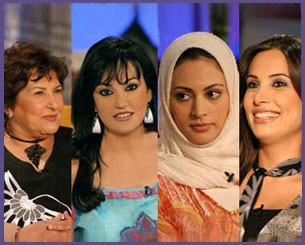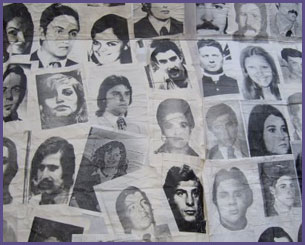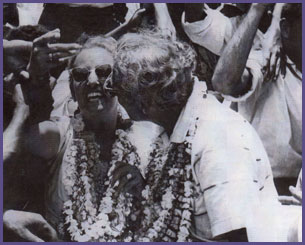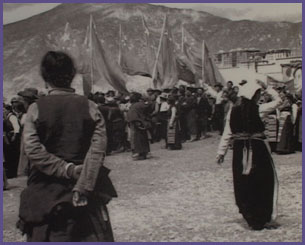Films on Democracy
A Sneak Peak at Women Power and Politics' Film List
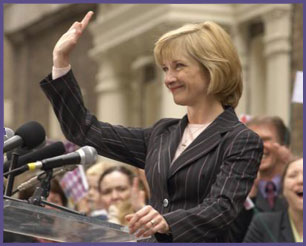
The Amazing Mrs. Pritchard, United Kingdom, 2006, Sally Wainwright
Feature, TV Miniseries, 364 minutes, In English
How many times have you said to yourself: "I could do a better job running this country!" The Amazing Mrs. Pritchard is a funny, smart, rollercoaster ride through the ultimate "what if?"
Ros Pritchard, a suburban grocery store manager, is fed up with politicians. On a whim, she decides to run for election herself, and ends up Prime Minister. She's a breath of fresh air: An ordinary person who speaks her mind. In no time she is leading a feminist revolution in British politics, as like-minded women all over the country follow her example to run for Parliament.
Once in office, Ros must still oversee her home, wayward children and husband while she guides her country through international crises. When secrets are revealed, she is forced to choose: Family or Power?
Dishing Democracy, Netherlands/United States, 2007, Bregtje van der Haak
Documentary, 60 minutes, In English & Arabic with English Subtitles
"Dishing" is a pun on "satellite dish" and the English slang word for "gossiping."
Sometimes powerful political action comes in a surprising package--like "Kalam Nawaem," or "Sweet Talk," a four-woman talk show on Arab satellite TV. Unlike official government programming, satellite TV is cut loose from national borders, state control and censorship, and the hosts of Kalam Nawaem take full advantage, discussing taboo subjects like sex, polygamy, wife battering, and equality between men and women.
The cameras take us behind-the-scenes to meet the four vibrant and outspoken co-hosts, each from a different Arab country and background, as well as out onto the street and into women's homes to capture viewer reactions. It's an exciting, fast-paced portrait of the power of sharing ideas across borders-women talking to women. As one host puts it: "I'm not interested in politics, I'm interested in people."
Las Madres, The Mothers of the Plaza de Mayo, Argentina, 1985, Susana Muñoz and Lourdes PortilloDocumentary, 64 minutes, In Spanish with English subtitles
The worst thing that can happen to a mother is to lose a child. To have one disappear without a trace is agony without end. During the 1970s and 1980s in Argentina's "Dirty War," 30,000 sons and daughters disappeared. In a society where women are expected to be silent, Las Madres chronicles Argentinean mothers who demanded to know the fate of their "disappeared" children.
As individual mothers find one another, their group begins to grow, and private tragedy is transformed into a powerful activist movement. We watch as hundreds of mothers gather each week in the Plaza outside the presidential palace. Dressed in black, they carry their children's names. They march as an ever-present reminder that their, and their country's, need for an answer will never disappear.
Thunder in Guyana, United States/Guyana, 2003, Suzanne Wasserman
Documentary, 50 minutes, In English
Director Suzanne Wasserman had a readymade story to tell in her first film. Her cousin, Janet Rosenberg, a white, Jewish woman from Chicago, was the president of the South American nation of Guyana, and considered the mother of her country by the largely African--and East Indian-Guyanese population.
Janet Rosenberg met and married Guyanese Cheddi Jagan in 1943, and the couple set off for his homeland to start a socialist revolution. For over half a century they fought against colonial rule and exploitation--despite imprisonment and the intervention of world figures including Winston Churchill and John F. Kennedy. In 1997, Janet Jagan succeeded her husband as president, becoming the first foreign-born and first woman to lead the country. Thunder in Guyana is an unlikely and amazing portrait of a country--and a family's--history.
Women of Tibet: A Quiet Revolution, United States/Tibet, 2006, Rosemary Rawcliffe
Documentary, 58 minutes, Tibetan & English with English subtitles
A Quiet Revolution chronicles one of the great, but little-known, movements of non-violent resistance in modern history. In 1959, 15 thousand unarmed Tibetan women gathered to protest a decade of forced occupation by the Chinese, an event that came to be known as "The Women's Uprising."
Forty years later, they live in exile in India, and struggle to preserve their language, religion and culture in hopes of someday returning home. We hear the unique perspectives of three generations of women: Some who took part in the protest, others who were only girls at the times, and still others who were born and raised in exile.
Living with them in exile is their spiritual and political leader, His Holiness the Dalai Lama. He gives his perspective on the women he calls "Phamo"--"Heroes."


